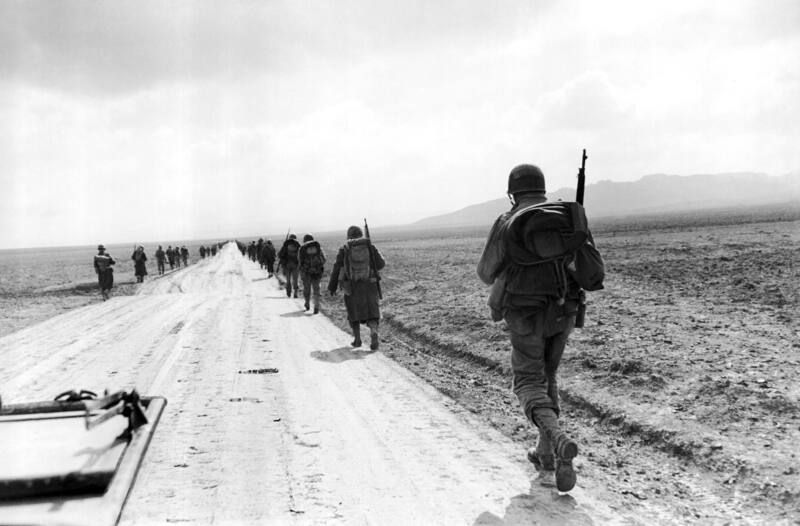
The roundup of the Jews of Barce, Derna and other towns in eastern Libya began in the spring of 1942. The order came directly from Italian dictator Benito Mussolini. Colonial authorities packed the Jews on trucks for a five-day journey across the desert to the Giado concentration camp. There, inmates received rations of 100 grams of bread a day and were subjected to forced labor. A plan to liquidate the camp by mass execution wasn’t carried out, but by the time the British army liberated Giado in January 1943, a fifth of the 2,600 prisoners had died of disease or hunger.
Libya is not on the mental map that most people have of the Holocaust. Nor are Tunis or Baghdad. In part, this is because the number of Jewish victims in North Africa and the Middle East was much smaller, and in part because the worst of the Nazi preparations for mass murder in those regions were foiled by a near-miraculous British victory.
But a pernicious myth that the long battle for North Africa in World War II was a “war without hate” is also responsible. Today, as we mark International Holocaust Remembrance Day, we should jettison the narrowly European geography of commemoration.
The phrase “war without hate” was coined by the German general Erwin Rommel, who commanded the Axis forces in North Africa for more than two years. It conjured a picture of warfare unstained by the unspeakable brutality of the conflict in Europe. And it fit a widespread British perception — described by preeminent war correspondent Alan Moorehead — of the fighting as “the high excitement of playing the most dangerous game on earth”, with “no civilian populations ... being destroyed”.
The blatant flaw in this description is that there were civilians. They suffered, to start with, the normal horror of war. Alexandria, Tel Aviv and Haifa endured Axis bombings. In Libya, Benghazi changed hands five times, leaving the city ravaged.
And they suffered even more. As historian Patrick Bernhard has documented, the Italian regime’s treatment of Libya’s population combined its prewar colonial cruelty with wildly disproportionate wartime retaliation for resistance. One method of executing alleged collaborators with the British was hanging them by butchers’ hooks through their jaws. Rommel’s headquarters urged “drastic measures” to put down resistance.
Libyan Jews were targeted twice over: as African subjects of the colonial empire, and as the objects of Mussolini's racial anti-Semitism, which grew along with his alliance with Nazi Germany.
Vichy France, another colonial regime aligned with Germany, let loose a cascade of anti-Semitic decrees against the large Jewish communities of Morocco, Algeria and Tunisia. Algerian Jews were stripped of the French citizenship they’d previously enjoyed. Across French North Africa, Jews were banned from most professions. In Algeria, they were stripped of their property. In Morocco, they were forced to return to overcrowded Jewish quarters where disease quickly spread.
On the far end of the Middle East, in Iraq, it was a local regime that ignited anti-Jewish violence. In April 1941, pro-German colonels carried out a coup in Iraq. Government radio broadcast Nazi propaganda. Paramilitary groups arrested or occasionally murdered Jews on the streets of Baghdad — a city that was then one-sixth Jewish.
Britain invaded and the Iraqi Army crumbled. But before British troops entered Baghdad, a pogrom erupted. “Several hundred Jews were brutally murdered”, the British ambassador dryly reported. “A large number [of Jews] would emigrate ... if only they could find a country to take them”.
Germany itself made explicit preparations for genocide in the Middle East. In June 1942, Rommel’s army invaded Egypt from Libya. The SS, confident of victory, put an officer named Walther Rauff at the head of an Einsatzkommando responsible for “executive measures” — mass murder — against the 75,000 Jews in Egypt and the half-million Jews in Palestine.
Rauff flew to the battlefront at El Alamein, 60 miles from Alexandria. There he met Rommel's chief of staff, who told him that logistics problems were holding up the advance. This was a fragment of the truth.
In fact, an extraordinary British espionage breakthrough had silenced the Axis intelligence source responsible for Rommel's supposed sixth sense about enemy plans. The British defense at El Alamein took him by surprise. Tenacious fighting by British, Indian, Australian, New Zealand and South African troops trapped the Axis army in the desert.
Rauff never reached Cairo or Jerusalem. A few month later, though, Germany occupied Tunisia as its last redoubt in Africa — and Rauff was quickly deployed there. Under his orders, at least a hundred Jews were killed and thousands were rounded up for forced labor. Some, it’s essential to note, were hidden from the Nazis by local Arabs.
Rauff planned to deport Tunisia's Jews to the death camps in Europe. Only a handful were actually shipped before Tunisia fell to the Allies. Military victory was, again, what saved Jews from genocide.
There was no war without hate in North Africa and the Middle East. The myth erases the perpetrators, their crimes and the greater crimes they planned. It forgets victims and rescuers, and robs those who won the victory of a measure of their glory. Let us not forget.
Gershom Gorenberg is the author of “War of Shadows: Codebreakers, Spies, and the Secret Struggle to Drive the Nazis from the Middle East”.
